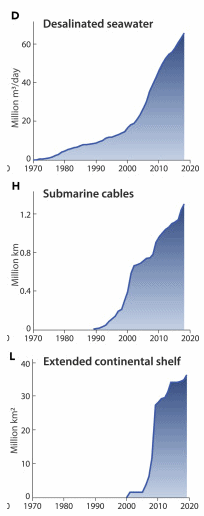Graph of the Day: Predicted US Temperatures to 2040
American west threatened by more heatwaves than past models have predicted 
By Hannah Hoag Extreme temperatures are expected to become more common in the western United States by 2040 if greenhouse gases continue to rise, researchers say. Noah Diffenbaugh, a climate scientist at Purdue University in West Lafayette, Indiana, and his colleagues simulated climate change for the United States in decade-long periods from 2000 to 2039 using a climate model that divided the land into areas just 25 kilometres square. It is the first time that the region’s temperature extremes have been modelled at such high resolution. The new projections were reported on 26 May at the joint assembly of the American Geophysical Union in Toronto, Canada. Some regions where high seasonal temperatures had occurred just once during the second half of the twentieth century are projected to experience extreme temperatures many times in a single decade, according to the model. “The once-in-50-years event becomes the five-times-in-ten-year event, and in the western United States it is much higher than that — up to eight times per decade,” says Diffenbaugh. Colorado, Arizona, New Mexico and Utah stand to be the most affected. The new simulation indicates that the western United States will experience more temperature extremes than projected by the global climate models used in the Fourth Assessment Report of the Intergovernmental Panel on Climate Change. Many of those models do not account for the topography of the region — which includes the Sierra Nevada Mountains, for example — in a realistic way, says Diffenbaugh.
An increase in the frequency of temperature extremes could affect crops, river flow and electricity consumption in the western states. For example, regions with the climatic conditions suitable for premium wine grape production might shift, shrink or even disappear with rising temperature extremes1. “If humans and ecological systems have adapted to the current climate and if they experience temperatures they have never before experienced, it may be a problem for some systems,” says Alan Robock, a climate scientist at Rutgers University in New Brunswick, New Jersey. “But Diffenbaugh doesn’t say which ones.” …
